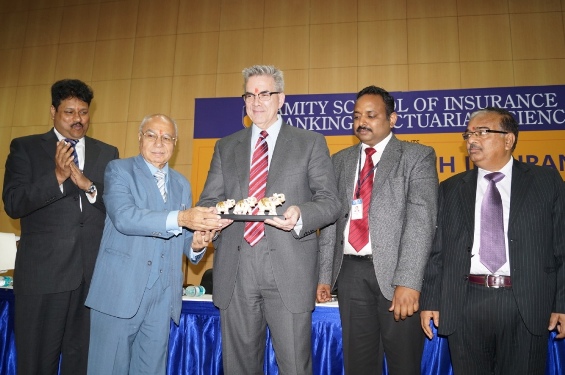23 Feb 2013|Noida | Amity University Campus, Sector-125 Noida
Amity School of Insurance, Banking & Actuarial Sciences organises Seminar on Health Insurance

The escalating cost of medical treatment today is beyond the reach of a common man. In case of a medical emergency, cost of hospital room rent, the doctor's fees, medicines and related health services can work out to be a huge sum. During such times, health insurance provides the much needed financial relief. To discuss and deliberate upon the Health Insurance scenario in India, Amity School of Insurance, Banking & Actuarial Sciences in association with Oriental Insurance Company organized a Seminar on Health Insurance with a theme Challenges of Underwriting vis-à-vis Marketing at Amity University Campus, Sector-125 Noida.
While delivering the inaugural address Mr. Niraj Kumar, General Manager – Oriental Insurance Company remarked that in insurance industry, number of grievances received or number of frauds committed is an indicator of growth trend of particular segment. In entire insurance sector, 90% of frauds and grievances come from health policies. Mr. Kumar said that in late 70’s, health insurance was known as sickness insurance and was part of accident policy. In 1986 mediclaim policies were introduced, but takers were very few in those days. Mr. Kumar further added that if one has to draw two curves for health insurance segment, one indicating growth and second learning curve, we can find that growth curve is ahead of learning curve which implies that our main aim is focused only on selling & marketing the health policies but we should rather learn from the shortcomings of this sector specially in terms of fraud and grievances and reduce the mistrust between the insured and insurer.
Mr. Richard Kipp, Managing Director – Milliman USA said that Milliman founded in 1947 is among the world's largest providers of actuarial and related products and services. While briefing the gathering about the health insurance, Mr. Kipp said that in India Health Insurance has increased tremendously over few years but India need to be cautious in its growth vis-à-vis USA where the growth has become stagnant. While talking on the role of underwriters, Mr. Kipp said that underwriters are like police men, constantly on vigil and taking guard against all the proposals for new policies before issuance.
Dr. Sanjay Srivastava, Dean – Faculty of Management Studies, Amity University outlined three sets of anxiety – foreseen, unforeseen and anticipated and Medical Insurance fall under anticipated anxiety. There are two sets of people, one who are conscious and goes for regular check up and second who rushes to hospital only on medical emergencies. Health Insurance provides financial security for all medical emergencies, therefore one much be extra cautious about the health and get necessary insurances, opined Dr. Srivastava.
Prof. R.R. Grover, Advisor - Amity School of Insurance, Banking & Actuarial Sciences said that India is a diverse country comprising of rural people, urban rich and urban poor. The urban poor is always neglected in terms of health services. Government spends only 3% on health related activities and only 10% people are the real beneficiaries. In India, health services are not going to be charitable and people should be ready to spend for their treatment. The irony of health insurance in India is that when first sign of cancer is seen or first symptom of heart disease is found out, then only people rush for health insurance policy. One should understand that health insurance is not meant for covering medical expense after the finding out of disease rather it is meant to cover persons for all medical needs averred Prof. Grover.
Inauguration Ceremony was followed by plenary session. Mr. Neeraj Basur, Chief Financial Officer – Max Bupa Insurance Company talked on the topic “Best Practices in Retail Underwriting”. In his presentation Mr. Basur said that there is lack of trust level amongst Hospital, TPA, Insurance Company and Customer. TPA does not trust hospital, hospital does not trust insurance company, insurance company does not trust hospital and all these don’t trust customer who is of utmost importance. Trust level has to improve and all have to understand that it is the customer whose interest is the binding factor. While speaking on underwriting, Mr. Basur said that it helps insurance companies to classify the risk as standard risk, sub standard risk as per the risk which each proposal carries. Underwriter decides premium rates according to the risk which proposal carries. Underwriter looks for many factors like age, height, weight, medical condition, marital status, Occupation, area of working, past & current ailments, personal habits like smoking or drinking etc.
While giving a presentation on “Health Insurance in India: The existing Scenario”, Dr. Y.P. Sabharwal, Appointed Actuary – Oriental Insurance Company said that the Indian Health Insurance Industry has been growing constantly in the last few years, even though it cannot be compared to the size of health insurance sectors of the rest of the world. Mr. Sabharwal said The Indian Youth Index is on the rise, which means that there are more youngsters than senior citizens and this results in the first misconception i.e. only older people need health insurance. Furthermore, most people are not sure of benefits that can be derived from health insurance. It is ideal for someone who is looking for a good mix of security, returns and medical assistance said Dr. Sabharwal.
During the day Mr. Richard Kipp, Managing Director – Miliman, USA talked on “Risk scoring in ailments and group pricing”; Mr. Vishwanath Mahendra, Vice President – Actuarial, Apollo Munich Insurance presented his views on “Pricing Techniques in Retail Health”.